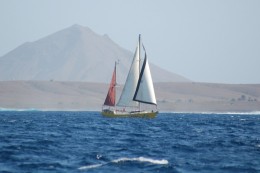
Whether you look on it as a means of transport or a way of life, sailing is one of the most environmentally sound activities on the planet. When we travel on the wind we leave less trace than a pair of unshod feet.
However, sailing involves much more than just hoisting the main and unfurling the genoa. It involves buying or building a boat and keeping it in good repair – and that, if one is not very careful, can involve all sorts of environmental nastiness.
If you are going cruising then the adventure also involves all the usual problems of modern living, such as the problem of how to avoid buying things that are packaged in plastic, and the problem of how to dissuade the Japs from rounding up the last few tuna, and the problem of how to keep your detergent from getting into the food chain.
We do our best to tackle these problems in a way which causes the least damage to the environment – because, you see, this environment is the only one that we’ve got…
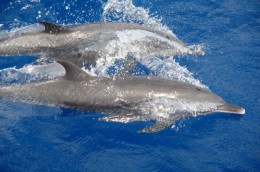
What will the ocean be when it is devoid of life? If we continue to ravage the seabed with trawls, and if we continue to use ever more efficient means of rounding up those few fish which remain, it will soon be as bare as a desert. And if we continue to use the sea as a waste disposal unit, and we continue to poison its waters through selfish concern for keeping our ships and fish-farm tanks and yachts completely clean and free of any fouling, then it will become utterly toxic.
When we sail, the highlights of our days are encounters with whales and dolphins. We also delight in naming the birds which wheel about our boat or patter along astern, and we are thrilled when we have the pleasure of their company for days or weeks at a time. Our calendar is marked out with these small adventures; they are the stepping stones which carry us from one side of the ocean to the other. When the fish and smaller fry are dead and the birds have wasted away, then the wind and the waves will seem less kind – will even seem cruel, I think – and traversing the sea will be a lot less wonderful. From a purely personal and selfish point of view, therefore, it is in our interests to avoid damaging even the minute organisms which are the basis of the ocean’s web of life.
— from How NOT to Build a Boat
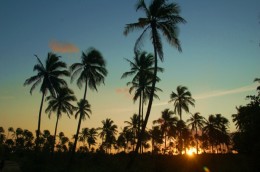
We’re also fond of trees, and of the things which live in trees. We like squirrels and monkeys and boomslangs, and we like wrens, macaws, rooks, egrets, kingfishers, toucans, and birds of paradise, and we even like spiders, weevils, leaf-cutter ants, and Peanut-Headed Lantern Flies…
So, all in all, we try our best to avoid doing things which will add another straw to the load that Mother Nature is carrying.
We do our best to persuade our friends to think about sailing and cruising in this same way, and to consider what they are doing. If you’re a fellow yotty, or if you plan to join us out here, then we hope that you will read these ideas and take the message to heart:
Rules For Green Cruising
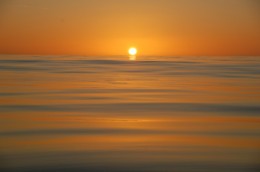
Real Sailors Like Sailing
We’d like to suggest that you chill out, when the wind goes phut, and enjoy the peace and quiet rather than resorting to the use of the engine.
It matters not that every ship pumps out more pollution than you and yours will produce in a lifetime. We have to start somewhere, and we can only start with ourselves. Moreover, once you’ve tried it – once you’ve spent a day or two just drifting under the stars, at one with the world – we think you will find that you like it a lot. We actually like it better than sailing… and as you will have gathered, that’s saying quite a lot.
Bearing in mind how little we use it I sometimes wonder why we bothered fitting an engine in Mollymawk. In the past eleven years we’ve clocked up a grand total of 120 engine hours.
Why bother lugging around half-a-ton of cast-iron and two large tankfuls of fuel if you aren’t going to use them?
There are still ocean-going hobos whose boats don’t have any kind of auxilliary propulsion, excepting a sweep (a very big oar), so why don’t we have done with it and join the ranks of these purists?
The answer is that we consider an engine to be an important item of safety equipment. Without it we might find ourselves being carried onto the rocks one day when the wind fails us or – contrairiwise – when the anchor drags in a storm.
Without an engine we couldn’t have ducked out of the way of the fishing boat which came thundering down on us one day while we were drifting about, minding our own business, in the middle of the Atlantic.
And without an engine we wouldn’t be able to get in and out of a tight anchorage or a small port.
But just because we’ve got an engine that doesn’t mean that we have to spoil a peaceful afternoon.
“What is this life if, full of care, we have no time to stand and stare…” and watch for whales, swim under the keel with the fish, and enjoy the sunset in perfect tranquility?
As an added bonus, if you wait for the wind you will also save yourself a lot of money.
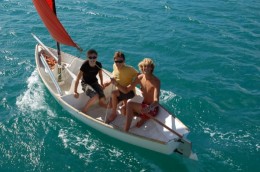
Real Sailors Like Rowing Too…!
We hope that when, finally, you get to harbour you will also use a sail or a pair of oars instead of an outboard motor when going ashore in the dinghy.
Yes, it will probably take more time… but it will also save money, keep a little bit of CO2 out of the atmosphere, and keep you fit.
You might also find that rowing helps you to make new friends. After all, it’s hard to say hello to someone who is zooming past at four knots (and making a foul noise and a stench as he goes) whereas a chap putting his back into things as he fights to make up against the wind and the current is certain to get a friendly wave. Sometimes he also gets offered a beer…
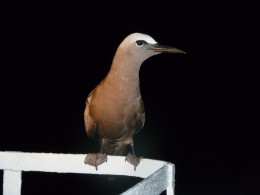
Please Don’t Poison Our Home
We recommend, too, that you avoid daubing your boat with toxic antifoulings which turn the sea into a poisonous soup. A little bit of weed will slow you down, but… so what? Where are you hurrying to anyway? A bit of weed will also encourage the fish and the birds to pay you a visit.
One day, we hope, the boffins will come up with something which is so slippery or foul-tasting that the barnacles and the sea squirts can’t get a toe-hold on our hulls; but in the meantime we make do with a copper-epoxy potion. When the growth gets too bad, we get over the side and scrape. We would be the first to admit that this is not an ideal arrangement – but it’s better than pumping poisons into the marine environment.
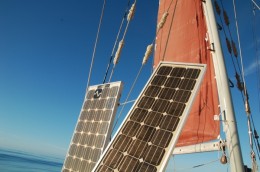
Get off the Grid
When we go cruising we cut ourselves off from the usual supply lines. This means, no more running water pouring into your home on tap – you’ll have to fetch that life-giving elixir for yourself now – and no more energy flowing abundantly and cleanly into your home to power your lights and computer and all the other essentials and excesses of modern living. Yotties have to make their own power or else do without.
In ye olde days sailors lit their cabins with oil lamps. These produce a cosy glow…
Then we progressed to 12 volt fluorescent tubes which produced a nasty whitish glow. We powered these 12 volt lights by running our engines regularly. The more lights you had the more you had to run your engine… so most of us spent our evenings huddled under one glow-worm. When the kids left the light on in their cabin they got yelled at; and when the batteries were low the light(s) went out.

Now we have LEDs, which produce a bright white light. When we first made the change we hated the glare, but now we love it. You can actually read a book by these lights…! And they use so little power that you can leave five of them burning all evening and the batteries hardly seem to notice. Allelujah! LEDs are the best thing to happen in the cruising world since the invention of the echo-sounder.
The other breakthrough in the yotting world came with the development of small wind-generators and efficient solar-panels.
Now, there is absolutely no excuse for running your engine to charge the batteries. You can harvest everything that you need from the wind and the sun.

Voluntary Simplicity
The cruising life tends to encourage us to be less acquisitive than the average Westerner. This is partly because we discover new values, but it’s also because we don’t have the space to hoard things.
If you’ve sold up to sail, loading all your worldly goods aboard, and you now find that you have a surplus of good things – if there’s no room in your lockers for that hand-woven sarong or those beautiful shells that the kids found on the beach – then we hope that you will find a way to share the bounty. The children’s unwanted Barbies and that T-shirt that doesn’t really suit you will put a smile on the face of a peasant fisherman or his daughter; so don’t be shy – get out there and hand them along.
After a while you’ll realise that the best way to avoid over-loading your boat is just not to give into your consumerist tendencies. It’s simple: just don’t shop!
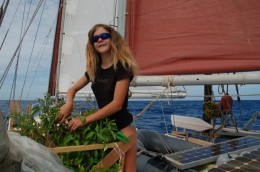
Eat Your Beans
We suggest, too, that you might like to give some thought to your eating habits.
Growing your own veg is tricky, afloat. Roxanne manages to produce tomatoes and chillies and various herbs, but I think it is only fair to say that she is excessively keen and has managed to bully her parents into thinking that a child without a garden to play in is deprived…
Still, you don’t actually have to carpet the deck in soil to get fresh greens in mid-ocean; you can sprout your veg in a jar.
Since beans are also good source of protein adding them to your diet will also relieve you of the need to invest in tins of corned-beef and tuna.
Catching your own dinner on your own hook and line is fine if you don’t mind killing things – it’s all part and parcel of the cruising life – but if we want to preserve our own back garden then we need to stop buying tins of fish; stop buying fish-fingers; stop buying anything, indeed, which hasn’t been caught locally, on a hand-line or in a small seine net or a fish-trap, by the men who live in the bay where we are anchored.

Going one step further – you can’t really call yourself an environmentalist and walk around with a clean, green conscience if you are still eating factory-farmed meat, because the production of meat causes the creation of far more carbon gas than the production of vegetable protein. If you can’t do without meat then you’d better ask the local guys to chase a goat down from the mountainside.
Other Ideas for Cleaner, Greener Cruising
The use of a pressure cooker and a hay box (an insulated box which serves as a slow-cooker) saves gas – which saves money, environmental damage, and the trouble of finding somewhere to re-fill the gas bottle at frequent intervals.
Going one step further, one could also use a solar cooker… but this is not easy aboard a yacht at anchor since the cooker needs to be carefully aligned to the sun. On the other hand, solar water-heaters work well in the tropics. The simplest consists of a black shower bag which is hung in the rigging. (Be careful; when conditions are optimum it will very quickly get far too hot to be used as a shower.)
We plan to build a black-painted box on the deck and plumb it directly into the galley or the bathroom (so-called…) but thus far we haven’t found the time to do more than talk about the project…
Finally, if you can avoid the use of detergents – or at least reduce their use – then you’ll be doing the planet a favour. It’s already overloaded with xeno-oestrogens and other deadly chemicals.
Traditional methods of washing the dishes include the use of coarse grass (in Spain) and wet sand (in St Helena Island). We also find that a dog works well.
The best way to save on squeezy is to add a squirt of vinegar to the water.
And the best way to save on laundry soap is to do without clothes.
Engines, squeaky-clean hulls, tinned tuna, factory-farmed meat, and clean white T shirts are for the morally depraved.
All in all, we hope that the cruising lifestyle will teach you to live as frugally as you can, so that we don’t add to the ills of this dying planet.
If anyone has any other ideas or suggestions for Greener Cruising we would be very happy to post them here.
